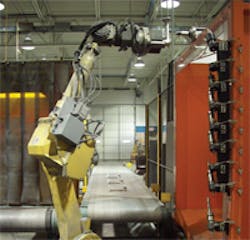One of the more surprising recovery strategies for foundries emerging from the recent recession has been to emphasize finishing and machining capabilities. They’re not machine shops, but their something more than metalcasting operations — and that’s their point.
Premier Aluminum in Racine, WI, produces castings in a variety of ways, including low-pressure castings; permanent mold castings, including tilt pour and static pour capabilities; and semipermanent mold castings for cored products.
The new company president, 34-year-old Jason Dannenberg, explains that Premier Aluminum is a metalcaster that aims to occupy a larger, more essential place in the supply chain, avoiding commoditization of its products and providing customers with more reasons than affordability for selecting its products.
Dannenberg understands machining: he was recruited to the foundry by its former owner, having demonstrated his potential by running a machining operation that did regular business with Premier Aluminum.
He joined the company in 2001 as a manufacturing engineer, and afterwards became its machining manager. As Premier Aluminum was purchased by Ligon Industries LLC in 2006, he became the manufacturing manager. All during this time he was studying, too: he’s earned an associate’s degree in industrial engineering and a bachelor’s degree in business management. Presently, he’s pursuing an MBA.
Ligon Industries is a holding company for a range of manufacturing operations, including aluminum castings, and as Premier Aluminum’s former president retired earlier this year it created the opening for Dannenberg to take the helm of the Wisconsin operation.
Dannenberg says he views the recent recession as an opportunity to take a more comprehensive understanding of manufacturing, focusing intensely on process design, production, and delivery, all supporting the effort to achieve customers’ preference over the competition.
Diversification and differentiation
But, with this understanding Dannenberg expresses two firm principles for Premier Aluminum’s organizational strength: “diversification and differentiation.”
“Diversification” means establishing an array of product lines, and avoiding the temptation to invest resources in what he describes “quick return” production programs, such as automotive markets: those may be lucrative, for a time, but they’re too hard to sustain profitably.
Instead, Premier Aluminum has established what Dannenberg calls a “tripod” of customer groups that includes various durable goods, food-service equipment components, and pressure tight castings for the electrical utility industry.
“Differentiation” means creating an identity for Premier Aluminum that is distinct from that of its competitors, so that customers will know who is supplying them, and why they were selected. “Typically,” Dannenberg explains, “OEMs don’t want to work with several suppliers to purchase a single product.”
Premier Aluminum’s competitors are other domestic foundries, mostly, so Dannenberg is familiar with the challenges of the market. However, the company aims to compete for business globally, and has done so successfully. It’s another reason for a manufacturer to avoid competing on the basis of affordability.
Dannenberg goes on to explain that casting buyers prefer to have a single reliable supplier so they can avoid additional costs, improve delivery times, and achieve more reliability for the products they buy. Just as important, having production capabilities that extend beyond metalcasting allows Premier Aluminum to increase the value of its products. Thus, in addition to multiple casting options, Premier Aluminum’s in-house capabilities include custom tooling manufacturing, metalcasting, robotic finishing, and machining. It also has complete quality-control testing capability (pressure testing, and helium leak testing) on site, and, in partnership with other operations, it offers powder coating, surface finishing (anodizing), and heat treatment.
Machining assets
Because Dannenberg spent nearly five years managing a machine shop, he recognizes that expanding Premier’s machining proficiency brings another advantage: it allows it to understand its products more completely. He mentions that Premier Aluminum sees a lower reject rate on its machined products because the machining processes give the foundry better insights to problems’ root causes, so the manufacturers understand their own processes better.
Premier has over 30 machining “assets,” according to Dannenberg. The capabilities include five horizontal machining centers, several vertical machining centers, all with optional fourth-axis capability, and one with a fifth-axis option. (For those readers who are unfamiliar with machine shops, four- and five-axis capabilities are by no means standard, but they are an excellent indicator of a shop’s expertise, technical capability, flexibility, and efficiency.)
Premier Aluminum also has several lathes, and multiple turning centers that feature production diameters up to 40 in.
Dannenberg says the future will see more investments in robotic capabilities, including automatic ladling in the foundry and automated cleaning of finished castings, to increase throughput and improve product quality.
Expanding its range of capabilities started prior to the recession, but proceeding with it through this period has helped define Premier Aluminum’s long-term strategy — for itself and for its customers. Having multiple production capabilities makes the company less vulnerable to future shifts in market demand because it improves the value of finished products to both the producer and the customer. For the producer, those capabilities allow it to define its manufacturing role more completely. And, for the buyers, it certifies the importance of selecting cast products from a particular, reliable source.
